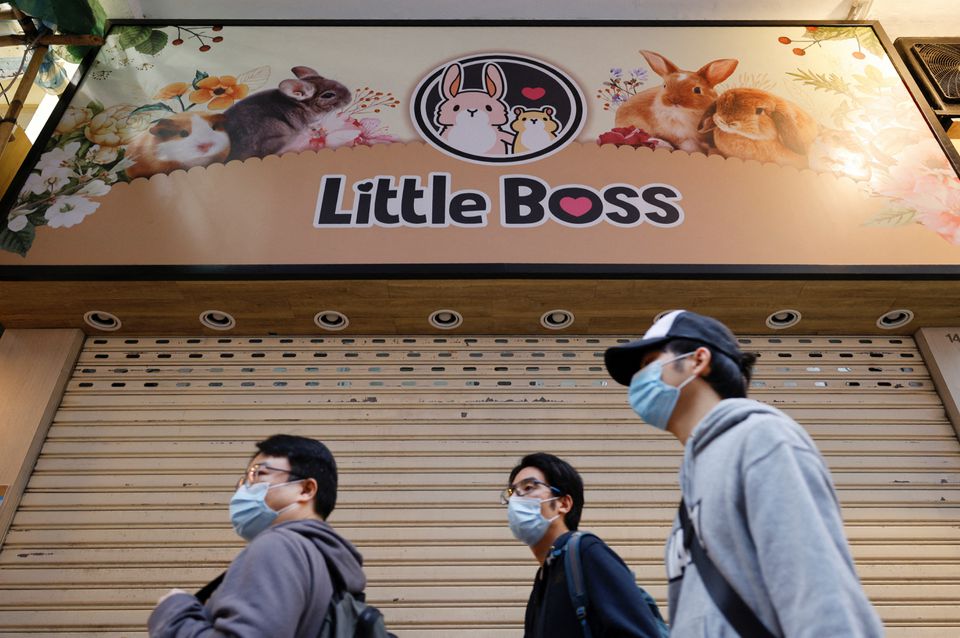
People stand in front of a temporarily closed pet shop after the government announced to euthanize around 2,000 hamsters in the city after finding evidence for the first time of possible animal-to-human transmission of coronavirus disease (COVID-19) in Hong Kong, China, January 18, 2022. | PHOTO: REUTERS/Tyrone Siu
HONG KONG — Thousands of people in Hong Kong volunteered on Wednesday to adopt unwanted hamsters after a mass cull order from the government over COVID-19 fears raised alarm that panicky owners would abandon their pets.
Authorities ordered on Tuesday 2,000 hamsters from dozens of pet shops and storage facilities to be culled after tracing a coronavirus outbreak to a worker in the Little Boss petshop, where 11 hamsters subsequently tested positive for COVID-19.
READ: Hong Kong to cull hamsters after COVID-19 found in pets
Scientists around the world and Hong Kong health and veterinary authorities have said there was no evidence that animals play a major role in human contagion with the coronavirus.
But having pursued a policy of zero tolerance for COVID-19, Health Secretary Sophia Chan said on Tuesday she could not rule out any transmission possibilities and therefore the government could take no chances.
Soon after, health workers in hazmat suits were seen walking out of pet shops around the city carrying red plastic bags into their vans. Some 150 of the petshop’s customers were sent into quarantine.
Public broadcaster RTHK said some hamster owners were seen handing over their animals at a government facility in the New Territories, while groups swiftly formed on social media to identify new owners for unwanted pet rodents.
Ocean, 29, a hamster owner and the administrator of ‘Hong Kong the Cute Hamster Group’ on the Telegram social media app, said the group was contacted by almost 3,000 people willing to take care of unwanted animals temporarily.
Three young owners were pressured by their families to get rid of their hamsters even though they all owned them for more than half a year, said Ocean, who declined to give her last name fearing angry reactions from those who support the cull.
“Many pet owners are unfamiliar with the exact risks and give up their hamsters,” she said.
Bowie, 27, one of those who volunteered in the group, is now the owner of two new hamsters.
“This is ridiculous,” said Bowie, who already owned three other hamsters. “Animals’ life is also life. Today it can be hamsters or rabbits, tomorrow it can be cats or dogs.”
The local Society for the Prevention of Cruelty to Animals (SPCA), which runs veterinary clinics, told Reuters “numerous” worried pet owners have been contacting them for advice.
“We urge the pet owners not to panic or abandon their pets,” SPCA said in a statement.
SPCA listed ways to maintain strict personal hygiene for the safety of humans and animals, including never to kiss, cough at or snort near pets, and washing hands after handling them.
The average lifespan of a hamster is about two years, according to animal welfare groups.
‘Overblown’
Aside from ordering the cull, authorities asked dozens of petshops to close, while imports and sales of small mammals were suspended. Buyers of hamsters after Dec. 22, 2021 were asked to hand them to authorities for culling and not leave them on streets.
Authorities set up a hotline for enquiries. It was unclear how many hamsters had been handed in.
Most Hong Kong newspapers featured pictures of people in hazmat suits in front of pet shops and illustrations of hamsters on their front page on Wednesday, with pro-Beijing Ta Kung Pao daily showcasing a tiny rodent inside a spiked virus particle.
Vanessa Barrs, professor of companion animal health at City University of Hong Kong, said the move to cull the hamsters up for sale could be justified on public health protection grounds, but fears of infection at home were overblown.
“Millions of people around the world have pets, and there have been no cases proven of pets transmitting infection to other humans,” Barrs said.
“The theoretical risk is there, but it just doesn’t happen.”